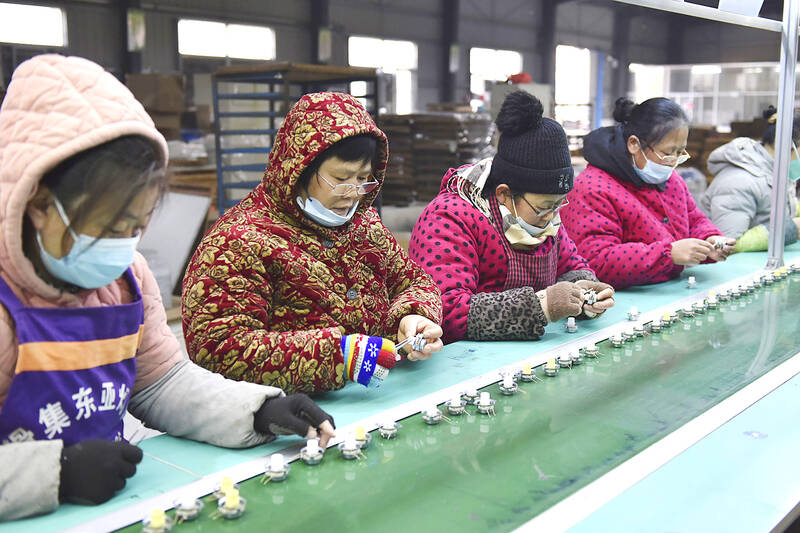China’s factory activity shrank at the sharpest pace since the COVID-19 pandemic first emerged about three years ago, after Beijing’s abrupt reversal of counter-epidemic measures last month set off a wave of COVID-19 infections across the country.
The official purchasing managers’ index (PMI) fell to 47.0 last month from 48.0 in November, the National Bureau of Statistics said on Saturday.
Economists in a Reuters poll had expected the PMI to come in at 48.0. The 50-point mark separates contraction from growth on a monthly basis.

Photo: AP
The drop was the biggest since the early days of the pandemic in February 2020.
The data offered the first official snapshot of the manufacturing sector after China removed the world’s strictest COVID-19 restrictions last month. Cumulative infections likely reached 18.6 million last month, UK-based health data firm Airfinity said.
Analysts said surging infections could cause temporary labor shortages and increased supply chain disruptions.
Weakening external demand on the back of growing global recession fears amid rising interest rates, inflation and Russia’s invasion of Ukraine could further slow China’s exports, hurting its massive manufacturing sector and hampering an economic recovery, they said.
“Most factories I know are way below where they could be this time of year for orders next year. A lot of factories I have talked to are at 50 percent, some are below 20 percent,” said Cameron Johnson, a partner at Tidal Wave Solutions, a supply chain consulting firm.
“So even though China is opening up, manufacturing is still going to slow down because the rest of the world’s economy is slowing down. Factories will have workers, but they will have no orders,” Johnson said.
The bureau said 56.3 percent of surveyed manufacturers reported that they were greatly affected by the epidemic last month, up 15.5 percentage points from the previous month, although most also said they expect the situation to gradually improve.
In 2021, inflation-adjusted GDP reached 114.92 trillion yuan (US$16.66 trillion), up 8.4 percent from 2020. GDP expanded 3 percent in the first nine months of last year, compared with China’s official full-year goal of around 5.5 percent.
The World Bank expects growth for last year of 2.7 percent.
The non-manufacturing PMI, which looks at services sector activity, fell to 41.6 from 46.7 in November, the bureau’s data showed, also marking the lowest reading since February 2020.
The official composite PMI, which combines manufacturing and services, declined to 42.6 from 47.1.
“The weeks before Chinese New Year are going to remain challenging for the service sector as people won’t want to go out and spend more than necessary for fear of catching an infection,” Capital Economics head Asia economist Mark Williams said.
“But the outlook should brighten around the time that people return from the Chinese New Year holiday — infections will have dropped back, and a large share of people will have recently had COVID and feel they have a degree of immunity,” he said.

UNCERTAINTY: Innolux activated a stringent supply chain management mechanism, as it did during the COVID-19 pandemic, to ensure optimal inventory levels for customers Flat-panel display makers AUO Corp (友達) and Innolux Corp (群創) yesterday said that about 12 to 20 percent of their display business is at risk of potential US tariffs and that they would relocate production or shipment destinations to mitigate the levies’ effects. US tariffs would have a direct impact of US$200 million on AUO’s revenue, company chairman Paul Peng (彭雙浪) told reporters on the sidelines of the Touch Taiwan trade show in Taipei yesterday. That would make up about 12 percent of the company’s overall revenue. To cope with the tariff uncertainty, AUO plans to allocate its production to manufacturing facilities in

Taiwan will prioritize the development of silicon photonics by taking advantage of its strength in the semiconductor industry to build another shield to protect the local economy, National Development Council (NDC) Minister Paul Liu (劉鏡清) said yesterday. Speaking at a meeting of the legislature’s Economics Committee, Liu said Taiwan already has the artificial intelligence (AI) industry as a shield, after the semiconductor industry, to safeguard the country, and is looking at new unique fields to build more economic shields. While Taiwan will further strengthen its existing shields, over the longer term, the country is determined to focus on such potential segments as

Chizuko Kimura has become the first female sushi chef in the world to win a Michelin star, fulfilling a promise she made to her dying husband to continue his legacy. The 54-year-old Japanese chef regained the Michelin star her late husband, Shunei Kimura, won three years ago for their Sushi Shunei restaurant in Paris. For Shunei Kimura, the star was a dream come true. However, the joy was short-lived. He died from cancer just three months later in June 2022. He was 65. The following year, the restaurant in the heart of Montmartre lost its star rating. Chizuko Kimura insisted that the new star is still down

While China’s leaders use their economic and political might to fight US President Donald Trump’s trade war “to the end,” its army of social media soldiers are embarking on a more humorous campaign online. Trump’s tariff blitz has seen Washington and Beijing impose eye-watering duties on imports from the other, fanning a standoff between the economic superpowers that has sparked global recession fears and sent markets into a tailspin. Trump says his policy is a response to years of being “ripped off” by other countries and aims to bring manufacturing to the US, forcing companies to employ US workers. However, China’s online warriors